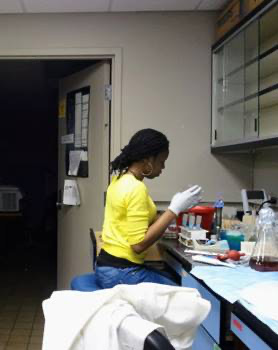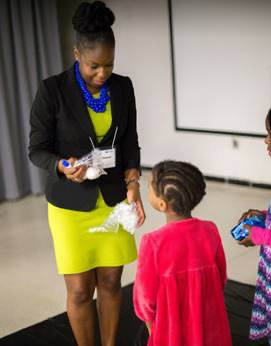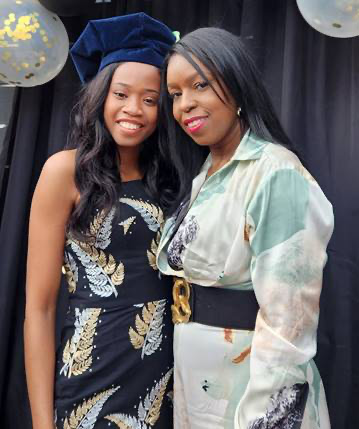Navigating Challenges in STEM: A Personal Reflection

In the following blog, Dr. Lola Olufemi, a Senior Portfolio Manager at NIH, shares her journey within the science, technology, engineering, and mathematics (STEM) domain. Driven by her own experiences, Dr. Olufemi is committed to empowering future scientists to pursue their dreams and aspirations.
At NIH, Dr. Olufemi is responsible for overseeing the agreement and invention portfolio for researchers at the National Institute of Neurological Disorders and Stroke.
Navigating Challenges in STEM: A Personal Reflection
 In 1876, Dr. Edward Bouchet earned his Ph.D. in physics at Yale University, becoming the first African American to receive a Ph.D. from an American university. Over the years, leaders such as W.E.B. Du Bois, Thurgood Marshall, and Dr. Martin Luther King, Jr., fought for equality in education. While things have improved, Black Americans Latino/Latina/x/e Americans, and Indians/Alaska Native Americans remain underserved in STEM at all stages. The attrition of these groups results from a lack of access to opportunities and resources as well as institutional biases that allow micro- and macroaggressions to proliferate.
In 1876, Dr. Edward Bouchet earned his Ph.D. in physics at Yale University, becoming the first African American to receive a Ph.D. from an American university. Over the years, leaders such as W.E.B. Du Bois, Thurgood Marshall, and Dr. Martin Luther King, Jr., fought for equality in education. While things have improved, Black Americans Latino/Latina/x/e Americans, and Indians/Alaska Native Americans remain underserved in STEM at all stages. The attrition of these groups results from a lack of access to opportunities and resources as well as institutional biases that allow micro- and macroaggressions to proliferate.
For me and so many of my colleagues who have received a Ph.D. in STEM, this is the reality in which we live. During my graduate studies, I received a comment likening me to what African Americans were during the early stages of this country, specifically slaves. I also had a cartoon posted in my lab next to my bench that depicted chained, enslaved African men.
The struggle intensified when my experiments faced consistent tampering. Initially, I assumed I was making mistakes. However, I noticed when I finished an experiment within one day, it worked; if I incubated it overnight, it did not. When I duplicated the same experiment, the one in our open lab environment consistently failed while the duplicate experiment worked.
 After reporting the incidents, I ultimately had to address them myself. I worked 12-to-24-hour days, strategically in different lab locations. Duplicating experiments and creating dummy stocks became my defense mechanism. I would put the real stocks in my colleague’s freezer in one lab and the fakes in my central lab. I had to adapt these strategies in a space where I should have been able to do research unencumbered by harassment.
After reporting the incidents, I ultimately had to address them myself. I worked 12-to-24-hour days, strategically in different lab locations. Duplicating experiments and creating dummy stocks became my defense mechanism. I would put the real stocks in my colleague’s freezer in one lab and the fakes in my central lab. I had to adapt these strategies in a space where I should have been able to do research unencumbered by harassment.
I chose not to drop out of my program because I knew my struggle was bigger than me. As Mel Robbins famously said, “You have been assigned this mountain so that you could show others it could be moved.” People like Dr. King fought so I could be where I was so I felt obligated to make things easier for those who would come through the ranks after me.
Persistence in the face of adversity
As we commemorate the life of Dr. King and celebrate Black History Month, I encourage my colleagues to continue to find creative ways to make STEM education more inclusive. I advise research fellows to not give up in the face of harassment and discrimination. As Dr. King stated in his 1960 address at Spelman College, “If you can’t fly, run. If you can’t run, walk. If you can’t walk, crawl, but by all means keep moving.”

Do you have a story idea for us? Do you want to submit a guest blog? If it's about equity, diversity, or inclusion, please submit to edi.stories@nih.gov.
For news, updates, and videos, subscribe or follow EDI on X, LinkedIn, EDI Blog, and YouTube.
More Information
As part of the 2024 Black History Month Observance Campaign, we invite you to join us on February 13 from 12 p.m. to 1 p.m. EST for the fireside chat, “Resolute Paths: Strategies for Navigating Scientific Careers.” You can take part virtually or NIH employees can attend in person. Learn more about Dr. Olufemi's inspiring journey and gain valuable insights and tips on selecting the ideal faculty mentor for your own STEM journey. Dr. Olufemi will be joined on stage by Dr. Beverly Watkins and Kiana Atkins.


